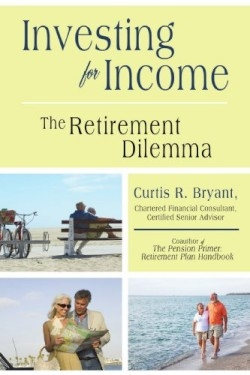Investing for Income
The Retirement Dilemma
Even before the most recent economic downturn, retirees saw their income under siege. Company pensions were disappearing and 401(k) plan contributions were shrinking. Workers planning to retire soon increasingly found that they had to work longer.
These conditions are still true, but the picture is even gloomier. This is why the authoritative Investing for Income is a welcome addition to retirement literature.
Curtis R. Bryant is a chartered life underwriter, a chartered financial consultant, and a certified senior advisor. Bryant is himself recently retired, so he has a perspective on investing that is all the more relevant.
Investing for Income cannot provide investors with a comprehensive plan for success. Rather, as the author says, “it is a sourcebook of ideas for the financial advisor or retired—or soon-to-be-retired—individual to use in considering the various concepts, products, and services that may help maximize income and assure it is adequate for a lifetime.”
Bryant provides, with a fair amount of detail, an explanation of various investment vehicles, including annuities, life insurance, stocks, real estate investment trusts (REITs), and others. The author does a particularly good job of explaining stocks by offering a very useful “risk classification” of publicly traded stocks.
Bryant discusses tax aspects of investing, living on a fixed income, long-term care issues, how to pick a stock fund company, and why it’s important to have a financial advisor. In short, he covers the gamut of what retirees need to know about investing.
The author’s writing can be technical and detailed, which may intimidate individuals without any financial background. But Bryant makes up for this with plenty of illustrations and anecdotes. His “nuggets” are especially insightful; for example, he writes, “Shares that have a price/earnings ratio of fifty or higher are not an investment, but rather, a speculation.”
Bryant makes it clear that those nearing retirement should have a different perspective on their portfolios than when they were in the building stage. This becomes crucial “if you are to not outlive your investment assets.” Bryant says a financial advisor is essential because that person can be far more objective and rational about investment decisions. A common mistake investors make, he says, is to “ride their portfolio all, or most, of the way down. Once it is near the bottom, they sell out, book the losses, and wait until the market has somewhat recovered. This gives them a booked loss that will never be recaptured—irrespective of how well they may do with future investments.”
Investing for Income has the potential to help readers on the verge of retirement reduce the risks associated with investing their hard-earned money.
Disclosure: This article is not an endorsement, but a review. The publisher of this book provided free copies of the book and paid a small fee to have their book reviewed by a professional reviewer. Foreword Reviews and Clarion Reviews make no guarantee that the publisher will receive a positive review. Foreword Magazine, Inc. is disclosing this in accordance with the Federal Trade Commission’s 16 CFR, Part 255.

